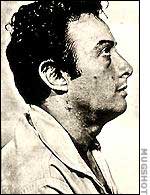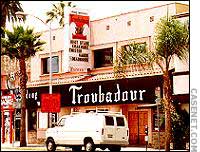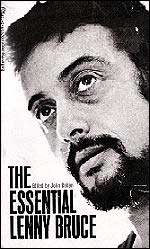The Lenny Bruce Story
A Litany of Arrests

It would not be his last scrape with the law over drugs - he was arrested again in
The first of those occurred just a few weeks after the
It was a complicated legal battle. The first court proceeding ended with a mistrial when the original judge failed to inform Bruce of his legal rights. In March of 1962, he was acquitted after his attorneys convinced a jury of San Franciscans that while Lenny Bruce might have been caustic, his work was hardly obscene, at least not under the prevailing social standards of that city.
But that was not the end of it.

Six months after he was acquitted in
While he was preparing for trial in those two cases, he was arrested again in
It seemed as if Lenny Bruce could not walk onto a stage anywhere without being arrested. Club owners who had originally been drawn to the controversial comic because of his ability to draw audiences were now shying away from him because they didn't want to draw the law down on themselves.
Bruce's income was drying up, and his legal fees - not to mention his drug expenses - were continuing to mount. By 1965, the sick comic who had once been paid a king's ransom for his work was broke, and was forced to declare bankruptcy.
What's more, the pressure of fighting multiple legal battles was taking its toll on his work.
In some cases, audiences who came to see Lenny Bruce skewer authority instead witnessed a man on the verge of collapse, who could just barely muster the strength to rant about his own persecution.
Still, says Collins, there were moments of brilliance.

On those occasions when he was at his best, it was because, in a bizarre, almost perverse sort of way, there was something in Lenny Bruce's character that caused him to find his own persecution liberating.
"I come back to the Bob Dylan line, 'If you ain't got nothing, you got nothing to lose'," Collins said, referring to those last fateful performances. "I mean, when he goes into a comedy club and they're ready to foreclose on his house...he can't get a job anywhere... in a sense it's liberating. He can just sort of look the law in the eye and say 'F--- you... I'm standing on my rights.' And that kind of courage is...born out of one's...own persona. I think it's born out of their circumstance...Tragedy is incredibly liberating."
Even at his lowest, Lenny Bruce recognized that the issues that were at stake went far beyond his little nightclub act. Perhaps it says something about the man that even as he was fighting for his life - though he may not have fully realized that at the time - that the people he was fighting were every bit as much pawns in the game as he was.
On a Web site devoted to Lenny Bruce's legal battles, Douglas Linder culled a comment from Bruce's performance at the Unicorn that underscores that idea. "Well, you know, we





- » Shortest Celebrity Marriages Ever
- » When Cheerleaders Hit Rock Bottom
- » Killer Kimveer Gill's Photos from VampireFreaks.com
- » Ma- & Pa-tricide: Sarah Johnson
- » Full Story: The Taylor Behl Case
- » Bloggers who Kill; Killers who Blog
- » Josef Fritzl: Dungeon Dad
- » The Scott Peterson Family Photo Album
- » Teachers Pet: Famous Female Pedophiles
- » Wedding Thrashers: Brides Gone Wild








